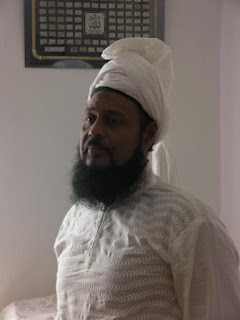“And seek help through patience and
prayer, and indeed, it is difficult except for the humble in spirit,
Who know
for certain that they shall meet their Lord and that they shall return to Him.” (Al-Baqara, 2: 46-47).
 Prayer (Salat) is a spiritual purification through which Muslims
are required to undergo five times a day. Prayer is an integral part of Islam
and is thus incumbent upon every sincere Muslim believer. Prayer enables Muslims
to affirm five times per day the Unity and attributes of Allah, and their
belief in Muhammad (pbuh), His Messenger. Prayer is therefore a part of the everyday
affairs of the Muslim – he has been commanded by God Almighty to pray in the
morning before sunrise, prayer is also ordained for him just after midday, a
third in the afternoon, a fourth just after sunset, and a fifth in the evening
before going to bed. Prayer is thus the first daily preoccupation of a Muslim
and also his last. Prayer enables man, even when at his busiest, to disengage
himself from worldly affairs in order to remember his Maker. Whilst Islam
emphasises the accountability of each and every individual to Allah, it allows
for the weaknesses and imperfection of man.
Prayer (Salat) is a spiritual purification through which Muslims
are required to undergo five times a day. Prayer is an integral part of Islam
and is thus incumbent upon every sincere Muslim believer. Prayer enables Muslims
to affirm five times per day the Unity and attributes of Allah, and their
belief in Muhammad (pbuh), His Messenger. Prayer is therefore a part of the everyday
affairs of the Muslim – he has been commanded by God Almighty to pray in the
morning before sunrise, prayer is also ordained for him just after midday, a
third in the afternoon, a fourth just after sunset, and a fifth in the evening
before going to bed. Prayer is thus the first daily preoccupation of a Muslim
and also his last. Prayer enables man, even when at his busiest, to disengage
himself from worldly affairs in order to remember his Maker. Whilst Islam
emphasises the accountability of each and every individual to Allah, it allows
for the weaknesses and imperfection of man.  Although one is supposed to pray five times a day, allowances are made
for those whose work schedules are such that they cannot break off at the
required times of day. Thus, certain prayers can be combined and said together.
Furthermore, if one is ill or on a journey, concessions are made so that the
number of prayers are reduced, or in the case of illness, the actual form of
prayer may be changed. For example, Instead of standing for prayer, the sick
person may sit down to pray and if he is unable to do even that, he can lie
down on the bed to pray.
Although one is supposed to pray five times a day, allowances are made
for those whose work schedules are such that they cannot break off at the
required times of day. Thus, certain prayers can be combined and said together.
Furthermore, if one is ill or on a journey, concessions are made so that the
number of prayers are reduced, or in the case of illness, the actual form of
prayer may be changed. For example, Instead of standing for prayer, the sick
person may sit down to pray and if he is unable to do even that, he can lie
down on the bed to pray.








